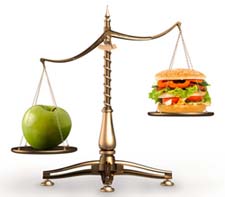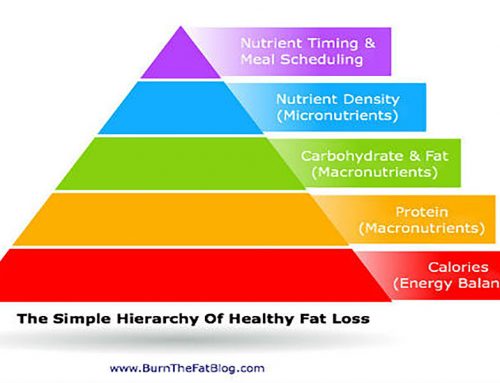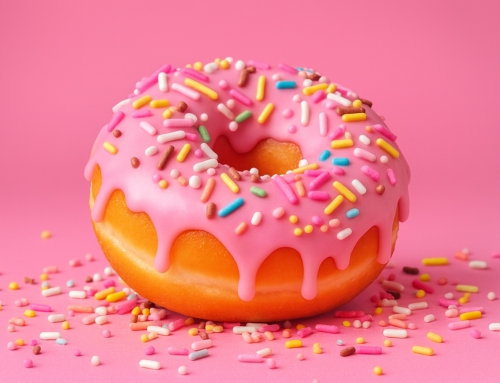Since this is the first Burn the Fat Blog post of the year, I sat down today with the intention of writing a list of the top 10 fat loss tips for the year, based on everything that we’ve learned from experience and new research from the past few years. But as I started writing about tip number one, it dawned on me that this one point was so important that it deserved to be highlighted in a post of its own. (I’ll come back to the rest of the tips later). This is the one absolute requirement for weight loss, and it’s something you’ve heard of before. However, there’s one critical distinction about this familiar advice that you might not have considered – and this 1 thing makes all the difference in the world…
 Let me quote Melvin Williams, PhD, professor emeritus of exercise science at Old Dominion University and author of the textbook Nutrition for Health, Fitness and Sport (McGraw Hill)
Let me quote Melvin Williams, PhD, professor emeritus of exercise science at Old Dominion University and author of the textbook Nutrition for Health, Fitness and Sport (McGraw Hill)
“Human energy systems are governed by the same laws of physics that rule all energy transformations. No substantial evidence is available to disprove the caloric theory. It is still the physical basis for bodyweight control.”
There are a variety of diet programs and weight loss “gurus” who claim that calories don’t count. They insist that if you eat certain foods or avoid certain foods, that’s all you have to do to lose weight. Dozens, maybe hundreds of such diets exist, with certain “magic foods” put up on a pedestal or certain “evil fat storing” foods banished into the forbidden zone.
Other weight loss “experts” invoke the insulin/carbohydrate hypothesis which claims that carbs drive insulin which drives body fat. That’s akin to saying “Carbs are the reason for the obesity crisis today, not excess calories.”
They are all mistaken.
Of course, there IS more to nutrition than calories. Food quality and nutrition content matters for good health. In addition, your food choices can affect how many calories you eat (some foods are more energy-dense, more palatable and less filling).
We could even point the finger at an excess of refined starches and grains, sugar and soft drinks (carbs!) as major contributing factors to the surplus calories that lead to obesity.
However, that brings us back to excess calories as the pivotal point in the chain of causation, not carbs. A caloric deficit is a required condition for weight loss – even if you opt for the low carb approach – and that’s where your focus should go – on the deficit.
Now, here’s that critical distinction…
You’ve heard it said, “exercise more and eat less” a million times. However, saying “focus on the deficit” is NOT the same thing. If you don’t understand the difference, you could end up spinning your wheels for years.
You could exercise more, but if you compensate by eating more, you cancel your deficit.
You could eat less, but if you compensate by moving less, again you cancel your deficit.
This type of compensation can happen unconsciously, which leads to confusion about why you’re not losing weight or why you’re gaining. That often leads you to make excuses or blame the wrong thing… insulin, sugar, carbs…. anything but the calories.
Therefore, “focus on the deficit” more accurately states the most important key to weight loss than “exercise more and eat less.” Make sure you understand this distinction and then follow this advice.
last but not least, keep in mind that there are a lot of ways to establish a deficit and many of those ways are really dumb. Eating nothing but grapefruits, cabbage, twinkies… but in a deficit?… Dumb!
A calorie deficit is required for fat loss, but once your deficit is established, the composition of your hypo-caloric diet DOES matter. That’s why any good fat loss program starts with calories but doesn’t stop there – you also need to look at protein, essential fats, macronutrients, micronutrients, food quality and how the plan you choose fits into your lifestyle.
Don’t let the simplicity of this idea fool you. This is the #1 key to your successful weight loss this year, and every year: Focus on the deficit
– Tom venuto, author of:
Burn the Fat, Feed the Muscle:
(Fat burning secrets of the leanest people in the world)
About Tom Venuto







Hey great blog!! You bring up a good point about “focusing on the deficit”. It can be so easy to think that by just doing one or the other eating less or exercising more that you will lose that fat, when actually those two factors need to be combined in order to get the result you are expecting.
Tom you totally knock it on the head again. Calories are KING when it comes to weight loss, and specifically what you say, being in a calorie DEFICIT is crucial for weight loss. I have adopted a conservative approach to my deficit through my diet and have increased my exercise. In the last year I have lost over 30lbs and I am in the final stages of getting my six pack. :-) Looking forward to BFFM 2.0!
Tom,I am really glad you chose to focus on this topic. While I have used BFFM nutrition throughout my transformation work, the key sticking point has been how to “get the deficit done” so to speak. Deviations here or there, an extra snack or 2 off plan and at times just all out lack of compliance have been a recurring challenge for me. I am in the process of changing the way I look at the term and concept “deficit”. I have tended to lean towards a definition that frames deficit in a way that engenders feelings of deprivation, lack and a fear of not “getting enough”.So I have begun to look at my “deficits” as the nutrition adequate to achieve my daily and longer term goals. Rather than thinking of deficits as a negative or difficult thing, I am re framing deficits to mean “exactly what I need to consume to achieve my goals” As I am making the shift from the feeling that a deficit means I am somehow grossly depriving myself, the stress and pressure I feel about deficits is starting to ease up.So while I agree focus on the deficit is paramount, I also think perhaps changing the way we define, think about and feel about our deficits is also important.Thanks again for an excellent post Tom!RegardsScott
A calorie deficit is a sine qua non for fat loss. Period.However, there are still people that will argue vigorously that calorie quality trumps calorie quantity. As if certain foods are able to override the laws of thermodynamics.That is why I think it is vitally important that people weigh and measure their food intake during their transformation period. Calories can easily “sneak” into one’s meals and cancel out of the deficit if one is not careful. It’s so easy to consume a sizable number of calories without realizing it, or even feeling satiated.What it boils down to is calories in vs. calories out. Once people accept this unimpeachable fact and starting scrupulously tracking their caloric intake, they will be amazed at the results!
Tom, excellent information!!!
Maybe not the best place for this comment but since I am here… I just finished 3 weaks of near “perfect” eating (according to BFFM guidelines) while maintaining my usual workout routine. After 3 weeks, I hoped to lose 6 pounds at 2 lbs per week…I lost 5 pounds! This is exciting since I have been stuck at the same weight for the last 2 years and my strength actually increased as my body weight decreased (Benched 350 x1 and 225 x 22!)I continue to recommend your book to just about anyone who will listen (or I think needs it).Sincerely,Von Kliem
Martin wroteDoesn’t protein require more calories to digest than carbohydrates? I think that might complicate the theory a bit.Yes, protein does have a higher thermic effect than other macros. therefore, if you substitute a significant portion of fat and carbs with protein, there can be a slightly greater fat loss in the higher protein group. There are studies showing that bumping protein from 15% to 30% of calories (substituting some carbs with protein) can improve fat loss slightly – even if calories are counted matched. (in a free-living situation – no calorie counting – the higher protein groups also tend to eat less due to appetite suppression so additional weight loss could be explained by lower energy intake)this does not disprove the calories in vs calories out principle, nor violate laws of thermodynamics – it confirms it, because the calories are not “missing”, they are accounted for – as you said, they are used in the digestion/processing of the protein. The net effect, after the energy cost of the thermic effect of food, is exactly as the calorie math would dictate.On a related note, this brings up an interesting point. the real “metabolic advantage” does not come from the *low carbs*, it comes from the higher protein. Some low carb diets which are high in protein are often credited with being better for fat loss… but ironically its the higher protein that should get the credit, not the lower carbsEnsuring adequate protein intake is very important on multiple levels, including for fat loss and as my post concluded, the composition of the hypocaloric diet DOES matter.
Tom,You’re right that a calorie deficit is crucial but not all calories are created equal. And how your body metabolises food can depend on personal factors as well as how the food has been cooked.Moreover, a low carb diet can help curb cravings, meaning that often calorie counting can be reduced or avoided completely
I have found after 20 years of trying it “all” the every meal with protein , a carb source and a fibrous carb is the best solution to curb cravings not low carb
The fibrous carb will slow the insulin response feared by many
sarah wrote:You’re right that a calorie deficit is crucial but not all calories are created equal….Moreover, a low carb diet can help curb cravings, meaning that often calorie counting can be reduced or avoided completelysarah, you’ve just confirmed what I said in my post. If a low carb diet curbs your cravings or reduces your appetite, then that diet has helped you achieve the calorie deficit. Whether you count calories and you are in a deficit or you dont count calories and you are in a deficit, the end result is the same.In my post I did not dismiss low carb diets or mention it among “dumb” ways to achieve a calorie deficit. In fact, I could easily argue for the opposite. I think a high protein, low (or moderate) carb diet can be one excellent way to achieve a deficitMy only gripe against certain hardliner segments of the low carb community is the idea that the calories somehow dont matter just because you are on low carbs or in ketosis, etc.
Thanks!!! I needed a different way to look at the obvious. I also need a “kick” start on this fat loss journey. I bought the online book early last year but must not have been “ready” to begin. This year will be different. Thanks for the pep talk (video talk), too.
Thanks for the post Tom. Makes sense. I should mention I have been a follower of BFFM for a LONG time now (hm….probably 8 years or so).In any event, wanted you to weigh in (pun intended) on this predicament I seem to be in. My weight has been creeping up and up over the last few years, and seems to have plateaued around 210 (5’8″ male, 44 yo). My frustration comes from the fact that I have cut calories down and down, even threw in intermittent fasting for a while, and it just didn’t seem to be helping me lean out.So, this is what concerns me when I read this post. A nutritionist told me that I need to eat MORE calories in order to reset my metabolism. I’m trying, but it seems like my appetite just doesn’t match how many calories I consume.Can you take calories down too low? Is this where the metabolic advantage from a lo-carb diet might enter the picture?Also, what the heck do I do to get this fat off my body? My exercise plan is good, work with a trainer and do good resistance training as well as interval training.
William, discussing how to determine the ideal deficit could take another article. But yes you can certainly cut calories too low – best bet is a conservative deficit of about 20% below maintenance for starters… establish a baseline, then make additional adjustments based on your weekly results. More aggressive deficit will lead to greater fat loss, but go too far and there are a multitude of negative side effects: hunger, low energy, training intensity suffers, metabolic adaptation.prolonged very low calorie diets (severe deficit) can trigger metabolic adaptation where energy expenditure (aka metabolic rate) decreases somewhat to conserve energy. this leads to slower fat loss than predictted.this usually happens with prolonged severe deficit, so if you’ve been on strict low cal diet a long time, then your nuritionsts advice makes sense: take a diet break and bring calories back up shortly to “reset metabolism.” Another helpful strategy is stay in deficit most of the time, but periodically (1-2 X per week) take refeed days where you eat more, which helps to lessen the metabolic adaptation, plus helps psychologically as well.Usually if you are not losing fat and youve been plateaud in body fat % / body composition, then youre not in a deficit and you should lower cals. But in the scenario i described above, taking a diet break or introducing refeed days is sometimes the best strategy.
Sarah wrote, ” Moreover, a low carb diet can help curb cravings, meaning that often calorie counting can be reduced or avoided completely.”Replacing carbs with protein does tend to suppress one’s appetite which can lead to a reduction in caloric intake. Whether that is achieved through a concerted effort or happenstance, if fat loss occurred then a calorie deficit was present.Bottom line, fat loss requires a calorie deficit regardless of how it’s achieved. I tend to eat more protein because of the satiety value. However, if I consumed too much protein or vegetables I could still get fat. A calorie surplus can equal fat gains, even on a “clean” diet.
Great way to start the year Tom! Rather than state sexy, sneaky, weird, and advanced techniques that ‘supposedly’ accelerate results, it’s time to master the fundamentals, especially at the beginning of a New Year. I personally believe that focusing on the fundamentals will increase the chances of sticking with your diet this year.I love that you wrapped up the post by advising us to first create the deficit and then work on improving the quality of food that you eat. I know that there’s plenty of room for me to improve the quality of foods that I eat, even if I do eat really well. But I don’t ever lose site of the caloric equation.Currently I am finding that creating my caloric deficit through nutrition, using my workouts as a means of shaping and sculpting my body, and a morning 30 minute brisk walk for recovery, stress reduction, and goal setting has been a great formula. When the warmer weather returns I’ll switch the walk for a bike ride, which typically means I will eat a little more, so there’s not much of a trade off in calories being burned between the bike ride and a walk, even though the bike ride is more intense.The fundamentals may not be sexy, but the MUST be mastered.Cheer to an amazing year Tom!Scott Tousignant
Tom,I love that you always explain everything so clear. Things that are really not so complicated can be distorted completely by the media and be very confusing for people that are trying to change bad eating habits or just trying to stay healthy. I think you are doing a Great job, getting the right information out that is easy to understand.Keep up the wonderful job! :)
I found the article in the attached link and interesting perspective on the subject:http://www.skeptic.com/eskeptic/11-01-05/#feature
Very good article, Tom. When it comes to weight loss the public is fooledagain and again and again….and then January comes around. LOL.
Thanks for your article TomIt seems that focusing on calorie deficit is appropriate.Around the world there seems to be an overall correlation between obesity and government deficit. This correlation can be seen close-up in the USA where it seems to be true OVERALL on a state basis. Without naming names there are some US states which are chronically deficit-ridden whereas others which are fiscally prudent (generally the less populous) and the obesity correlation is noticeable.I am all for burning the fat and being fiscally in surplus
I face a similar situation as William. I seem to have platued at the same point. My problem as I see it is related to BMR I’m eating at a maintenance level and need to be in deficit by either cutting calories further and or excersice more. Too much deficit can cause starvation response which may compound Williams current situation. Would spending a period of time in surplus help by jump starting his metabolisim?
Tom, your post is spot on. personally, a low-ish carb program has worked best for me, but I agree that you still need a calorie deficit on low carb. I think what happens is when you use a low carb approach, you are more likely to be in a calorie deficit automatically without even having to count calories and that seems to be a real advantage. I think low carbers would gain even more respectability ifthey would acknowledge that calories in vs calories out still applies regardless of the macro nutrients and low carb is simply a good way to achieve a calorie deficit
yes that’s why i usually start client out on my phase one nutrition plan…Phase 1 Nutrition Plan…which is a 1200 to 1500 calorie nutrition plan…a spartan one hour resistance training program burns 500 to 600 calories…20 to 30 minutes of cardio keeping the heart under 130 beats per minute…adds another 200 to 300 more calories…plus daily activity…another 300 calories…so this creates a 700 to 1000 calorie deficit…which means…you are burning up more calories than you are taking in…forcing the body to learn how to burn fat effectively and efficiently…and so you slowly begin to burn more fat…one pound of fat has 3500 calories…
Spot-on, informative and well written article Mr. Venuto..I am in throes of determining my particular caloric needs following several years of diagnosed anorexia nervosa. I have a marvelous team of eating disorder experts helping me in my recovery..yet they, and myself are stymied as to why my body has remained in a stunted metabolic state…as if it refuses to believe that the current refeeding will continue…and that another period of restriction or famine is just around the corner! I have been eating balanced meals, incorporating all food groups (many of which had been completely eliminated from my diet whilst ill) and even had a retour of a regular cycle for the first time in seven years last month. My question for you Tom, is this…Could my metabolism be permanently damaged or lowered from the years of restriction? In giving my body so little energy for years…could it have learned to adapt to this amount and save all surplus for potential future days of famine? Granted, my body has suffered and has a right to somehow question this new increased caloric allowance with a fair amount of skepticism…but my dedication to wellness…healthy eating and sufficient, non-excessive exercise (I used to run one hour and a half six days per week with a maximum of 800 calories of “fuel” per day) is true. Does someone with an adult anorexic episode of seven years (age 43 to 50) have the possibility to reestablish a normal burning metabolism? My BMI has gone from 13 (yes…way too ) to 24 in only twelve months…and it is a bit scary to have transformed so much…My team tells me much is water and my body readapting and “evening out” but it is oh so frustrating at times. If you have any insight into such metabolic mysteries I would appreciate your always sage insight.Most respectfully,Donna
That’s exactly right, “focus on the deficit”. I did not start losing until I got down to under 1200 healthy calories a day. My last bout with weight loss showed results at 1700 calories a day and I maintained that loss 10 years but still wanted to lose more. Tried 1200 a day for maybe one week at a time, saw only 1 pound or so loss and thought, forget it. The key was to STAY ON TRACK for over two weeks……then it showed a loss steadily and also became easy to stay in that calorie range. Still enjoyed a few parties over the holidays, cookies, cocktails, etc. but got right back on each next day and lost 7 pounds between Thanksgiving and New Years. So, “focus on the deficit” is it along with knowing your RMR so you will know your deficit.
Thanks Tom, that makes alot of sense.. This is my year to get fit.. Thanks again.
Hi Tom,Yep! You’re right again: we can never remind people too often that the calorie balance rules body weight.I love how you synthesize it into “focus on the deficit.”Best,Carl
Works for me! I guess it’s important to note (as you do in BFFM) that you need to vary you calories every 4th day or so or else your body adjusts itself to the lower calories :-0 The info in BFFM to help calculate the calorie deficit is sooo helpful!Thanks for sharing what you know!
Thanks for the reply and clarification Tom!
Tom, in a world where there so many voices shouting out about how to loose weight i.e. fat loss, it is refreshing to hear some common sense, although as someone said common sense is not common.I note from the comments as well as your replies there is a need to consider that different body types react differently to dietary intake. Depending on a person’s body makeup certain actions will be effective while others will not. In my case for instance, I can eat as much calories as I can fit in as well as eat fatty foods and not put on any long term weight. The result of over indulging in sugars and some carbs is that I get liverish and feel sick or too much fat just makes me ill. So I do limit my intake to a certain level. My main issue is putting on the weight.I do try to increase to amount of protein food I eat but as I understand to convert it into muscle one needs to do rather strenuous exercise. Here I come unstruck because of a Chronic Fatigue Syndrome condition that affects me. I have found that mild exercise, which which will not aggravate a lower back problem which I contracted from an adolescent illness, has been of great help. Another thing that is helping is just becoming aware of how I stand and sit, which has changed my posture reversing my chest on stomach situation. As my mother used to say, “Sit up and stand up, think at the top of your head”.So I don’t have a problem where I need to “lose fat” but I can feel for those that do. Sometimes it may be necessary to consider that it’s not the manner in which one consumes food but how your body actually handles the process. I note that this post is #1 point of many you will introduce to us over the next few months so you may already have this covered.
Good article, althogh most people fail in achieving their weightloss goals due to lack of consistency in their diet or exercise plans. I think weightloss requires constant motivation and a group support to be effective in long term despite of all the advices given in such blogs. A good article nonetheless.
katien wrote:Good article, althogh most people fail in achieving their weightloss goals due to lack of consistency in their diet or exercise plans. I think weightloss requires constant motivation and a group support to be effective in long term despite of all the advices given in such blogs. I agree completely on both points:1. lack of consistency in exercise or diet = lack of consistency in keeping a calorie deficit!!!2. group support is amazingly effectivethanks for your comments!
Hi Tom,If only there were more people like you in the world and more to the point on the internet. Honest advice with no catches. I have yet to see you try to promote anything that does not agree with what you preach. No gimmicks, no fast tracks, no shortcuts, no tricks. It is not what most people want to hear but it is the truth. And the truth is not always easy to stomach.There should a special price or honour for you. I mean that.Someone trying very hard to live your advice.
Tom I have been following you for over a year now and you have nothing buy solid content! I love referring people to your site because they never expect this kind of info for free.Cheers
Just to pile on the accolades, not only is the advice here great (I’ve basically used your book to lose 50 lbs over last half year while increasing strength), but what I really appreciate is your graciousness in sharing advice and responding to challenges by others. If common sense is rare, your kind attitude is even more rare and alone would make me a life long reader (and customer).
I don’t really get why more people and fitness trainers don’t understand the concept of a “calorie deficit”. It really seems pretty basic yet most people don’t believe it because they get the “eat less, exercise more” thing shoved down their throats. People will think they are doing great because they only ate say 900 calories but the key thing is where those calories are coming from.
Just my 2 cents :)
Mark wrote:
“i dont really get why more people and fitness trainers don’t understand the concept of a calorie deficit.”
Its also because its easier (and far more profitable) to believe in things like the “insulin fairy” or “those evil toxins” or their “clogged colons” etc etc. that are making you fat…
just COULDNT be too many calories could it… too simple
I completely agree with the focusing on the basics, I believe in the 80/20 rule in which 20 percent of something is responsible for 80 percent of the results. So focusing on the deficit is the true key.
Although I do believe that carbs do have a huge roll in the accumulation of fat and the lack of ability to burn fat when carbs are high in most individuals due to spiked insulin, which is why low carb/high fat has beaten all other macros when it comes to fat loss.(backed by many tests) Also since the food pyramid was changed in the 90’s and we were told to avoid “bad” fats and eat more “healthy” carbs obesity has skyrocketed. Also most carbs come from wheat which is genetically modified and contains new proteins and different levels of gluten which induce appetite and is also horrible for you. Its also clear that insulin is a fat storing hormone and it is harder to burn fat while insulin is spiked, although I doubt you can get fat if you’re in a deficit by eating lots of carbs, you most likely will become more insulin/leptin resistant, so that when you do go into a surplus you’re more likely to put on fat faster and easier then someone who avoids lots of carbs. I removed nothing but wheat products from my life and lost 40 pounds of fat without changing my exercise and made sure to keep my caloric numbers the same, altho the macros changed slightly. Just the fact that low carb beats high carb in fat loss trials, and that insulin/leptin resistance plays a major roll in fat gain/loss, and that most carbs for most people will be primarily GMO wheat, and the rise in obesity since told to eat primarily carbs, leads me to believe that yes deficit is king, but we cannot ignore the many biological dysfunction or adaptations caused by over eating carbs in most people.
Tom I just saw the documentary Fat Sick and Nearly Dead last night and it was a bit of an inspiration. I am sure you have seen it but the idea is to survive for a few days on just juicing and then walking or exercising as well. Seems to be good for super-nutrienting (I am sure that is not a word) your body to cleanse for a few days. As long as you have truly changed your diet and exercise for the deficit afterwards.
Does this make sense to you?
I hope this is ok to enter to win the book today because the link was not letting me in! thanks!! :)